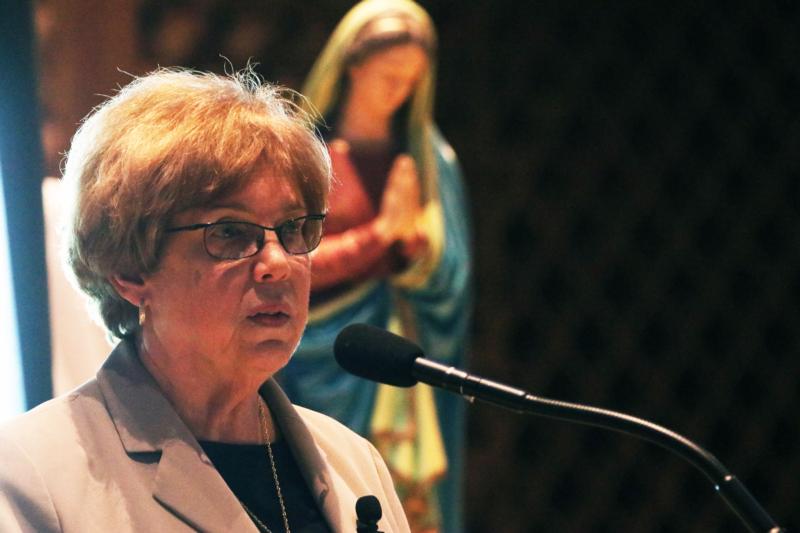
Dominican Sister Donna Markham, executive director of Catholic Charities USA, speaks about immigrants and refugees May 4 at All Saints Church in Portland, Ore. “These are our brothers and sisters, not freeloaders,” she told listeners. (CNS photo/Ed Langlois, Catholic Sentinel)
PORTLAND, Ore. (CNS) — The head of Catholic Charities USA is saddened that many Catholics have “become acclimated” to national resentment over migrants.
Dominican Sister Donna Markham, the agency’s president and CEO, told an audience during the Msgr. Thomas Tobin Lecture on Catholic social teaching May 4 that some Catholics have sidestepped the lessons of Jesus, who said, “What you did not do for one of these least ones, you did not do for me.”
Portland Archbishop Alexander K. Sample supported Sister Markham’s point, reporting that he receives angry letters after speaking up for immigrants.
[hotblock]
“We live in an age that treats migrants as if they were a disease,” he said, calling it “deplorable” that the country would turn its back on refugees and immigrants who are fleeing violence and poverty. “These are real people with real lives.”
While Catholic Charities nationwide aid about 600,000 refugees and migrants overall, agency officials expect the number of people being resettled to continue to decline.
In Portland, the archdiocesan Catholic Charities has seen the number of people it has resettled fall in recent years. Since the start of the fiscal year Oct. 1, the agency has resettled 105 people. In fiscal year 2016, 600 people were resettled while and 400 people were resettled in 2017.
Sister Markham admitted that at times the circumstances lead immigrant advocates to become “terribly demoralized.”
“But the gospel calls us to care for the most vulnerable. We are not about to stop now,” she said.
Meanwhile, Pope Francis and the U.S. Catholic bishops have made strong statements in support of the dignity of migrants. “They have responded to xenophobia with compassion, mercy and welcome,” Sister Markham said. “That makes me proud to be Catholic.”
[tower]
She told stories of refugees, including that of a concert pianist who fled Romania after her hands were broken by officials, and an Iraqi woman who escaped the Islamic State group after death threats, tearfully leaving her family behind.
Sister Markham admitted that she once thought of refugees and migrants as people looking for a handout. She is now ashamed of the view, having learned thousands of stories.
“They had no alternative,” she told the Portland crowd. “They had to run for their lives. These are our brothers and sisters, not freeloaders.”
She related the tale of a girl in the U.S. who returned home from school only to find that her father had been detained by immigration officials. “As Catholics, we think it is reprehensible to have families torn apart,” Sister Markham said. “This is totally against who we are as a church.”
Sister Markham suggested that Catholics plan small group potlucks and invite refugees and migrants to tell their stories. Erin Weisensee, a member of Holy Redeemer Parish in Portland, explained how she and husband Matt have befriended refugee families, taking them on trips and inviting them to events such as carving pumpkins.
“It depresses me to realize how few Catholics dive in to Catholic social teaching,” Archbishop Sample told listeners in remarks before the lecture. The church’s social justice work is an inseparable part of its primary mission of salvation for the world, he explained, saying, “It’s not an option.”
“We need as a church to continue to be that voice of reason,” the archbishop added. “We need constantly to be an active voice of social justice for all.”
The archbishop expressed sadness about polarization in the church when it comes to the social mission. Orthodox believers, he said, tend to back the pro-life cause, but at times do not show enough concern for other social justice matters, including the dignity of migrants. “And, frankly, it goes the other way, too,” he told the crowd.
“This isn’t a matter of either/or. I’d like to see us hold all of this together.”
***
Langlois is managing editor of the Catholic Sentinel, newspaper of the Archdiocese of Portland.
PREVIOUS: Catholic Communications Campaign aids efforts in U.S., around the world
NEXT: Iowa Catholic parishes gift artwork to mosque as a sign of friendship


Share this story